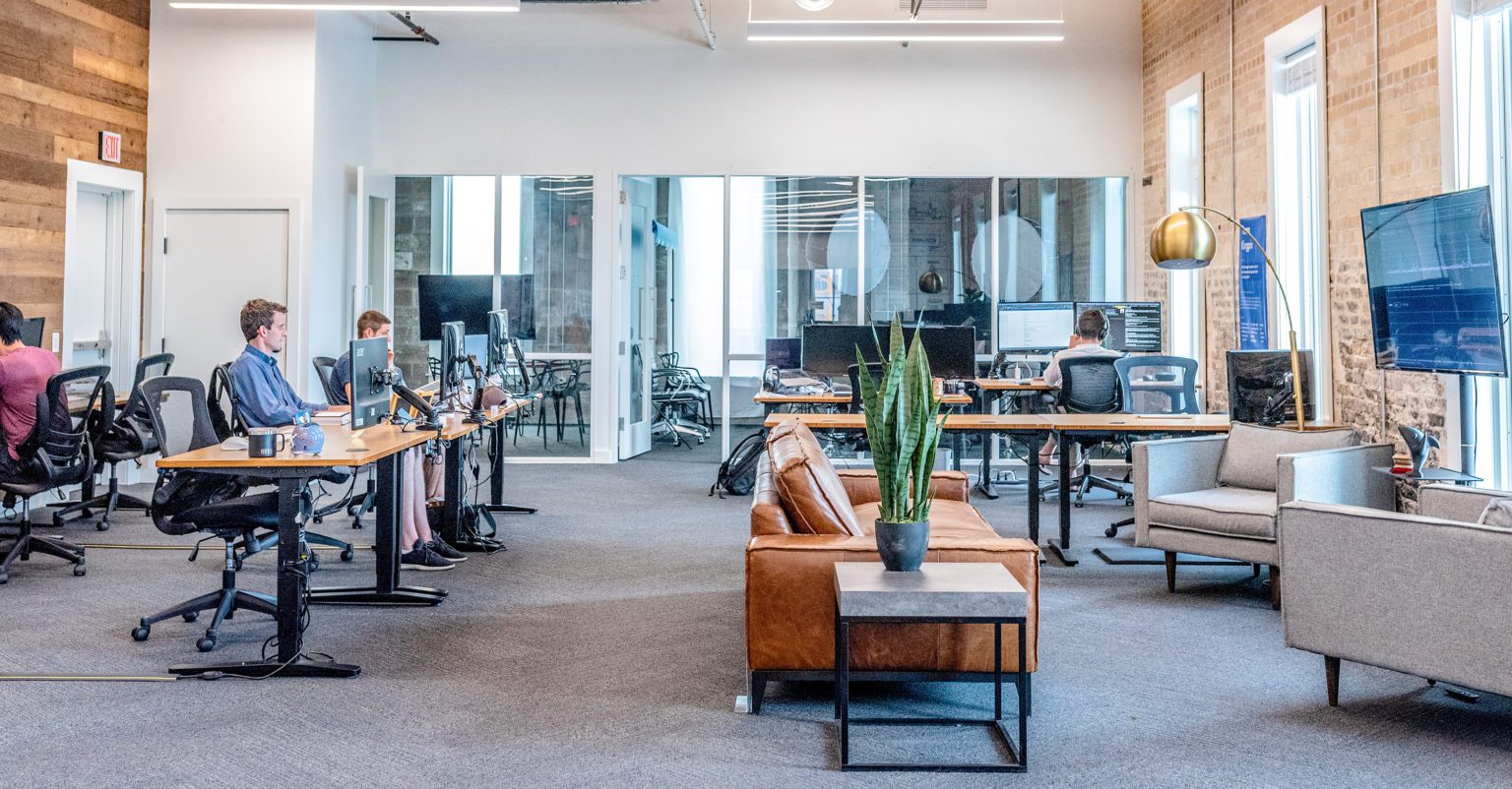With hybrid work arrangements all the post-pandemic rage, co-working spaces may help small businesses offer flexibility. We look at the pros and cons of co-working for small businesses.
Co-working spaces no longer conjure images of tech startup entrepreneurs riding their scooters down warehouse corridors in between virtual brainstorming sessions.
Now though, the trend has been on the rise for some years with a report from 2018 showing that 47% of New Zealand office tenants were planning to reduce their traditional leased office footprint space and 47% were looking to increase co-working space use.
Enter Covid-19, and the shift towards non-traditional workplace arrangements got a huge push. Even big corporates like AMP Wealth Management and Vodafone are moving out of the traditional main centre towers and embracing flexible workplace arrangements – moves that both impact on commercial real estate and complement co-working spaces.
But what about small businesses? Does co-working make sense for them? Here we look at some of the potential pros and cons of co-working arrangements for small businesses.
Pro: Co-working complements hybrid work
Some co-working space providers, such as Generator, allow businesses to take fewer desks than the number of staff. Hot desking and breakout rooms support hybrid work models where any given day, some staff may be working from home while others come into the office.
Pro: Lease flexibility
A co-working space can suit a small business not wanting to commit to a long-term lease on a commercial office space, especially given the chances of further lockdowns. Depending on contracts of course, small businesses can pay for the space needed, when it’s needed – and no more.
Pro: Furnished office space
Co-working spaces are furnished and ready to go. Part of what you’re paying for is the convenience of desks already chosen, chairs already matched, blinds already installed. Small business owners usually have enough on their plates and eliminating decorating from the mix is a winning prospect. It may help ease the pressure when your business is growing – instead of investing in more office infrastructure (and getting the allen keys back out), you could just add more desks to your agreement.
Pro: Tech, coffee, facilities
Not all co-working spaces are created equal, but some offer top-of-the line video conferencing facilities and onsite tech assistance, along with all the kitchen goodies you always wish you had, meeting and event spaces, and end-of-trip facilities (that’s a shower you don’t have to clean yourself and somewhere for staff to store bikes).
You might have to get in line for the coffee machine.
A possible con: If you have no need for tech, your team hates coffee and snacks, and no one uses gyms or rides to work, check all this isn’t included in your membership, as you could be paying a premium for access.
Pro: Networking opportunities
Some co-working providers make a feature of their networking events and opportunities, which can be great for small businesses looking to make connections. And the right space can go a long way to making a good impression on clients who want to see a dynamic, innovative and stylish workplace.
Con: It’s not for every industry
A cafe needs a kitchen, a mechanic needs a workshop, a nursery needs a greenhouse. So while there’s no limit to the potential for these kinds of businesses to set up their own co-working arrangements (case in point: the suburban nursery serving cappuccinos and scones or the city-fringe mechanic specialising in pour-overs), for the moment co-working providers are geared to businesses that can do what they need in an office-style environment.
Con: It’s not your own
There are other businesses working in the same space, and that may not suit everyone.
Just like you would if you were leasing a commercial office space, do your due diligence. Check noise levels, maximum capacity, transport access and parking.
Add to the list post-COVID: check cleaning, ventilation, and contact tracing and vaccination policies.
Why Maverick Digital said ‘not yet’ to a co-working space
While co-working can offer a useful solution to small businesses looking to offer more flexibility to their staff while taking the pressure off costs associated with office leases and fitouts, to be successful, it has to suit the business and its people.
Alex Dykman, founder of Maverick Digital, has weighed up the potential challenges and benefits of continuing to support a hybrid work model after the rollercoaster of lockdown. When we spoke with Alex earlier this year, she was focused on maintaining her team’s creative startup energy and team bond through the challenges of COVID. Now, another lockdown later, Alex has looked closely at whether co-working was right for her business, and ultimately decided it’s not yet.
Alex says:
“We’ve spent a tonne of time at home over the past few months, which was a little hit and miss in terms of being the right fit for Maverick Digital. We’re a team of communicators, creatives and collaborators. After around six weeks of working from home over lockdown, the work fulfilment, happiness and general motivation was starting to decrease. We thrive off energy and being with each other. We also have put so much effort into workplace culture, which is hard to maintain when everyone is working remotely.
“With this said, our team seems to enjoy the odd day working from home where they are in ‘head down, bum up’ mode – say, once or twice a fortnight – so we are looking into how we can potentially bring this to the table in an equitable way next year without having a detrimental impact on work fulfilment, collaboration or sense of togetherness.
“We actually tossed up a huge co-working space, when our lease came up for review this year. Right now we decided it’s not quite right for us – identity and autonomy is really important to Maverick, we tend to dance to the beat of our own drum a bit, and we were concerned that we would lose those things if we were to move in to a big co-working space with lots of other businesses.
“However, never say never; if the right fit came along we would definitely consider a co-working space. The shared amenities – gyms, food options, cafes, conference areas, retail etc – are a big plus and something we can’t equal with our current office setup.”
Need flexible access to funds that could help your business grow? Speak with one of our small business lending specialists.




